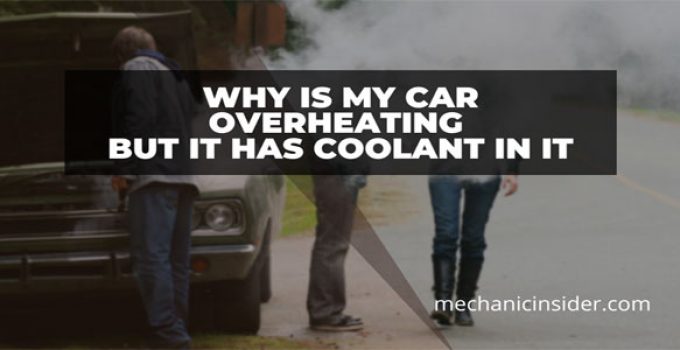Overheating must be an old issue for car owners in this modern era. Nowadays, most cars are designed to produce less heat with more efficiency. Technologies like coolant, thermostat, water pumps, radiators make it possible to prevent heating issues in cars sophisticated engine. But sometimes there are some technical faults which cause overheating. Instead of having coolant, cars might show heating issues.
WHY IS MY CAR OVERHEATING, BUT IT HAS COOLANT IN IT?
Overheating the engine can give you a headache sometimes. You might think, why is my car overheating, but it has coolant in it? If you want the answer, follow the article to the bottom line. It will help you to solve the heating problem of your car.
Overheating
Overheating has become a headache because it can damage your car sometimes. Unlike other machines, your car engine has a minimum temperature range on which it will give you the optimum result. As it handles so much power of a vehicle, heating is pretty normal.
But do not let it overheat and damage your engine, or else it will cost you a fortune. Sometimes the engine does not get enough heated or remain too cold. That can also cause you some problems. But not any long-lasting damage if you take proper steps or seek professional’s help.
Causes of Overheating
When your car’s engine is overheated, it means the coolant is not working correctly or stopped working. Engine’s combustion chamber, or you can say burning chamber produces heat during fuel is burning.
Mainly, coolants absorb the heat and then dissipate it to the environment. Let us discuss the most common causes when your car keeps overheating even with coolant:
Concentration of coolant
In an engine’s coolant system, there is always a specific coolant that is used in it. If you use any replacement of that or use any wrong mixture with distilled water, it can cause overheating.
You might think that your car is overheating and you have coolant. Why not add it? If you do that, the air conditioner will not work correctly. Therefore, you should maintain a regular coolant for your vehicle. Another thing to worry about is its concentration.
Well, any chemical component cannot maintain a constant concentration overtime a specific period. If you do not change it timely, it won’t give you the optimum result. Instead of cooling, your car might get heated quickly.
Again, this kind of chemical compound has corrosive nature. It would not be wise if you let the same coolant remain in the air conditioner.
Leakage
It is considered one of the biggest reasons behind overheating of any vehicle. Leakages interrupt the heat insulation system of the engine. It can happen anywhere hoses, thermostat housing, water pump, radiator, freeze plugs, head gasket, heater core, etcetera.
Suppose you find some leaks in the mentioned area. The first duty should be a replacement instead of waiting to check it out. Sometimes it should be repaired as soon as possible. If not, then it will require an expensive replacement for you.
Thermostat
It is the main valve of the engine’s cooling system. The job is to allow the coolant when it tries to pass through to the radiator. If the thermostat’s condition is terrible, it might get stuck in a closed position.
The coolant cannot pass through, and heat dissipation will be interrupted. Then the engine would become overheated in no time. Suppose you have seen any sign if the car is overheating or not. It would be great to check the leaks and thermostat at first and take immediate steps.
Circulation
Suppose your car is overheating even after adding some coolant. What is that supposed to mean, right? It is because of improper circulation of coolant.
Mainly, coolants are used in hot and cold weather to keep the engine running and not be affected by a sudden temperature change. Sometimes the low quality of coolants or improper mixing can cause a problem to circulation.
Leakage could be another reason for it. Because of it, some coolant will evaporate, and circulation will get hampered.
If your coolant mixing or antifreeze, or water mixture does not work correctly, the engine will get started to overheat.
Radiator
If your engine has any leaks or clogs, it might lead to the radiator failing. A radiator is a part that allows the coolant to reach the engine.
Thus, a cracked radiator could be the reason for overheating. Cause of any malfunction will interrupt the coolant’s path to the motor. Then it will not get enough heat transfer to the environment. The engine will fail to perform and get overheated over and over again.
The radiator would get clogged either from inside or outside depends on the dusty environment. If you ignore it, your engine might damage permanently.
Radiator Fan
Radiator fan also plays an essential part in cooling. It pulls the air from the surrounding and through it to the radiator. When coolants go through the radiator, it cools down more quickly.
But suppose the fan gets broken or has a clutch. What will happen then? It cannot help the cooling system. The temperature will not reduce like before, and this will lead to overheating the engine.
Therefore, you check out the radiator fan regularly while the engine gets heated.
Water Pump
Suppose the car engine is overheating, but the coolant level is full. A bad water pump could be the main reason for this. It is considered the heart of the cooling system of any engine.
A water pump is the main reason for circulating the coolant all over the engine’s sophisticated design. If the coolants go to the engine’s chamber and get stuck, wouldn’t it be a disaster?
Well, that is why a pump is needed. It makes sure of proper circulation of coolants.
Another function is to get back all the hot compounds from the engine’s chamber. If the pump’s material gets corroded or has any leaks, it will not work correctly. Therefore, improper circulation or partial flow can cause overheating of your vehicle.
Belts might be loose
Even if the pump’s materials are intact till now, its belt can cause some problems. Sometimes the strap is made of low-quality materials or gets corroded over time.
Therefore, it can break pretty easily at any time. If the belt is broken, it cannot handle the proper flow of the coolants. Then, lacking enough flow will lead to overheating of the engine.
Hoses
Mainly, hoses connect to the radiator, vacuum lines, air conditioning, and vehicle fuel lines. It is considered the weakest structural component of any coolant system.
Sometimes hoses can be blocked or detached. Then the coolant will get space to flow or to circulate.
Even if it is partially blocked, a proper amount of coolant will not get passed through it. Due to this lacking your engine will be overheated in no time.
Again, some cracks or holes can cause leakage to the hoses. Then the flow will be interrupted continuously. It will also affect the pump’s performance.
Signs of Overheating
Suppose your car has coolant, but it is overheating. There must be some signs to recognize it, right? Yes, there are. Let us show you the symptoms which you will notice quickly.
- You will notice some smoke or steam coming from the car’s hood after you start the engine.
- Any foul smell from the engine area could be a sign. It is because all the coolant smells sweet instead of burning incense (oil leaking).
- You will find a temperature gauge on your car’s dashboard. The red sign on it resembles the overheating of the engine. But professionals consider it a less reliable sign because it shows the readings a little later than it should.
Some Immediate Steps
When the car is overheating with full coolant or with an active cooling system, what will you immediately? There are some you should follow to avoid long-time damage to the engine. Here are the basic senses that would come in handy in the worst circumstances:
Step-1
Suppose you see the steams coming from the engine. The first step is to pull over immediately. Even if it is a false alarm, do not hesitate to do that. That is because continuing driving with an overheated engine could be dangerous.
Step-2
When you find a safe place to pull over, then shut off the engine. The active engine will not stop overheating until it has been shut down.
Step-3
Sometimes old cars get heated in summer days and might need to catch a breath. Thus, you should turn off the air conditioning of your vehicle. If the engine is not cooled down then, start the heater. That should help to stop the heat.
Step-4
After you shut down the engine, open the hood. But be careful there. Please do not open it hastily because an overheated engine produces high-temperature steam.
If you come in direct contact with this, some skin burn is a possible event. Therefore, give a moment there and then open the hood. It will help the engine to cool down. Let the engine sit idle for at least 30 minutes.
Step-5
Your coolant reservoir is full, but the car is overheating
Step-6
When you are in traffic, remember to rev the engine. It helps to move air and water throughout the radiator. Another thing to remember is to lay off the brakes. That is because continuous hitting on the brakes might raise the heat to the engine.
Cautions During Overheating
The first thing not to do during overheating is panic. Do not panic in any situation. Remember, it is not the end of the world. You can manage any mechanic nearby or seek roadside help. Even if these are not available, follow the mentioned immediate steps to prevent further damage. Sometimes a small act of those steps might solve the problem. Another thing to avoid is to keep driving. You might think the engine is running right! Then why not go the extra mile!
Do not think it is a good idea. That is because this could cause significant damage to the engine. The repair cost will get higher. When the smoke is showing up, do not open the hood right after shutting down the engine. Because hot steams would be harmful. It can lead to injuries.
Find the Root Cause
Most often, people think adding some extra coolant can solve the problem. But it would get worse instead of resolving. You have to find out the root cause and then take the necessary measures to solve it. If it is left unaddressed, saving the engine will be challenging in the long run.
How to Prevent
If you take some common ideas, you can avoid overheating issues.
First of all, do not park your car in sunlight. It would be best if you kept an eye on the temperature gauge and coolant level always.
If necessary, carry some extra coolants all the time. When you notice some leaks, immediately fix them.
Again, please do not rely on the gauge meter always and check it yourself now and then. Try to keep the car’s temperature down by letting escape warm air through window and floor vents.
Lastly, you should check the vehicle with a mechanic and maintain a usable cooling system.
Damages
Overheating is a pretty standard issue. You have to take the necessary steps during it or to prevent it. Typically, overheating does not give any long-lasting damage. But if you fail to resolve the problem or sit idly, the engine will be damaged permanently. Sometimes professional help is necessary to save the engine.
Final Words
After the discussion, you might get the answer to your question of why my car is overheating, but it has coolant in it? Keep your car’s engine healthy by avoiding overheating or taking essential measures. We wish you good luck.



